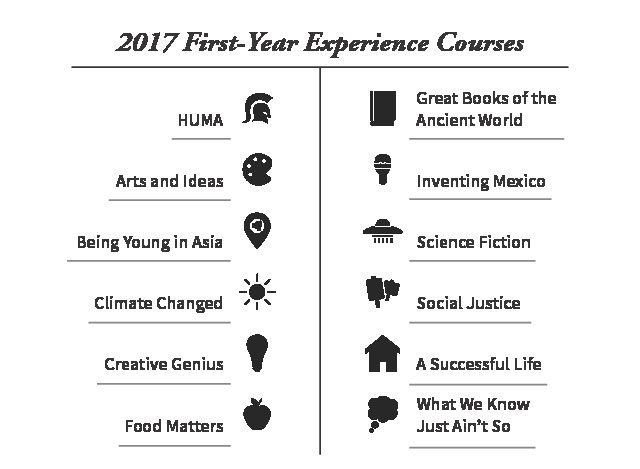As registration for first-years begins, there is one course that they will all be taking “” the First-Year Experience (FYE). These courses cover a wide variety of topics, ranging from fine arts to food to science fiction. The FYE is a requirement for the Pathways curriculum, and all first-years are expected to enroll in a six-credit FYE that includes a seminar and writing workshop that are taught by two different professors.
While first-years may be nervous about what to expect from the credit-heavy course, some of those who have already taken their FYE know that there is nothing to fear.
“I loved the way my class brought many seemingly-different historical figures and movements together to explore the many forms of “˜creative genius,'” said Natalie Curran, a sophomore art history major who will be a peer tutor in the fall for an FYE called Creative Genius.
While all of the FYEs challenge students to think outside of the box, some are rumored to be more difficult than others. Luke Ayers, a junior economics major, fondly remembers his FYE, called HUMA: Great Books of the Ancient World, despite the challenging coursework. Ayers will return to HUMA by serving as a peer tutor for the English department’s Jennifer Bartlett’s HUMA writing workshop course.
“Dr. Pache, my seminar professor, quoted Aeschylus, saying “˜learning through suffering’ was an apt description of the course. I wouldn’t go quite so far, but I think that the difficulty of the FYE class is important because it helps prepare first-years for their time at Trinity, not coddle them. My writing took a leap forward in HUMA that I didn’t really think was possible,” Ayers said.
The FYE faculty have been preparing and are excited for students to come and develop the skills they need for successful academic careers at Trinity.
“The class gives students a strong base for them to be successful in any field that they will be pursuing. We want the students to be able to write a paper, which is very important because we want them to be able to think critically and creatively. I want the students to become entrepreneurs in the way that they see their four years at Trinity, in order to see what skills they can refine to be successful after Trinity, whether they go into graduate school or into their profession,” said Roberto Prestigiacomo, professor of theater, who will be teaching Creative Genius.
All of the FYE courses demand a significant amount of writing, meant to help introduce students to the standard that will be expected of them throughout their college career.
“I remember thinking I was a pretty good writer coming out of high school, but after HUMA, five-page papers didn’t seem daunting at all, 40 pages of reading a night was a piece of cake, and when I had to start writing longer and longer papers for all of my other classes, I knew exactly where to start, all thanks to HUMA,” Ayers said.
When they’re not writing, the students will be discussing ideas with one another and exchanging ideas about the materials introduced to them in their course through the readings and seminars.
“The writings and people we discussed were all so multi-faceted, and our professors Dr. David Heller and Dr. Jacob Tingle were excellent in asking probing questions to drive the discussions even more,” Curran said.
Peer tutors such as Ayers and Curran will be in each class to assist the professor and the students in the course. They will also be available outside of class during office hours or by appointments to help the students with their papers and answer any other questions they might have regarding the material and expectations of the course.
“If you’re struggling, I would definitely recommend talking with your professors or peer tutors “” we are here to help. The FYE shouldn’t kill you, it should be a helpful stepping stone to practicing and perfecting both your writing skills and study habits,” Curran said.
Peer tutors are also eager to help the first-years succeed in their FYE, and hope to see them reach out during office hours or scheduled appointments.
“When I was a peer tutor for an economics class, I loved it when people asked for my help. We all love the texts we’re working with, and we really just want to help you love them too,” Ayers said.
“I would tell future students to just come without worries and enjoy the experience, because we did not have this course three years ago,” Prestigiacomo said. “Just enjoy, have fun, and understand that it is going to be challenging.”







